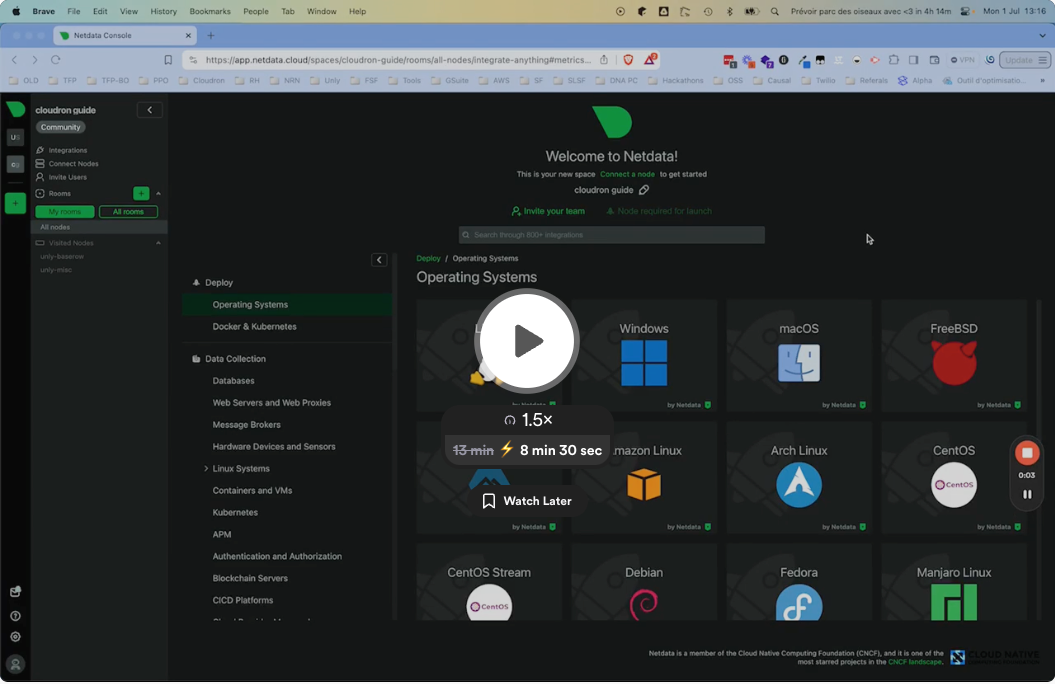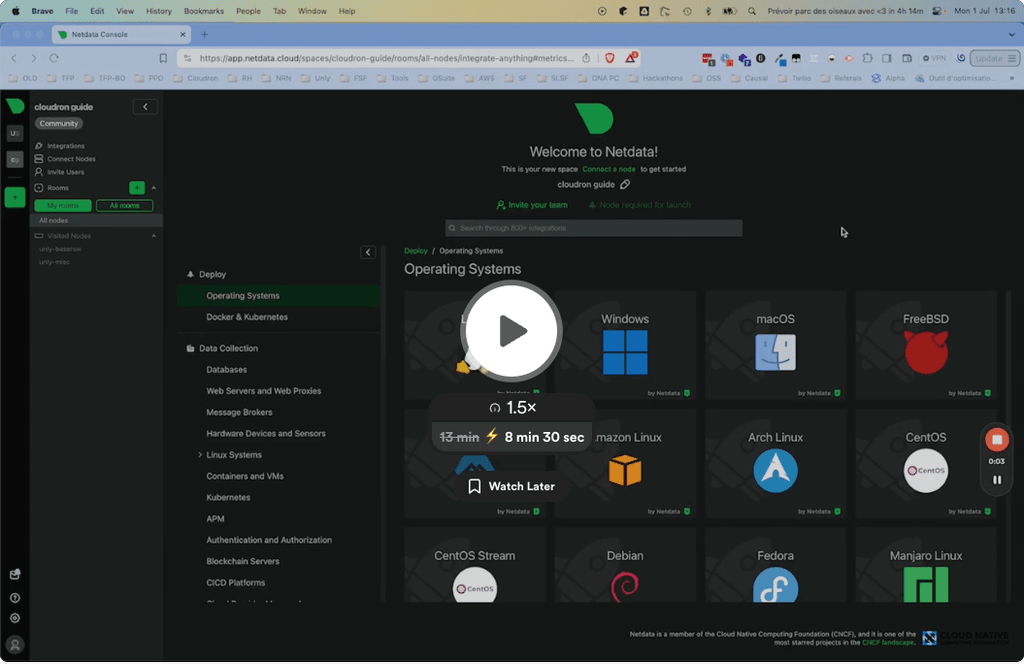Guide: How to add monitoring to your Cloudron server for free (RAM/Disk/etc.), using Netdata (5mn setup)
-
@AmbroiseUnly What's your GitLab id? We have to bump the repo limit on our side and then you should be able to fork.
@girish said in Guide: How to add monitoring to your Cloudron server for free (RAM/Disk/etc.), using Netdata (5mn setup):
@AmbroiseUnly What's your GitLab id? We have to bump the repo limit on our side and then you should be able to fork.
5263
Thanks
-
A AmbroiseUnly referenced this topic on
-
@AmbroiseUnly done, thanks
-
-
So just to be clear netdata is not a free solution, and you have to send your ssh credentials for the server to their platform.
So theres a risk that they get hacked and the credentials would be stolen...I'm not really sold on the cost / risk / benefit of doing this.
-
So just to be clear netdata is not a free solution, and you have to send your ssh credentials for the server to their platform.
So theres a risk that they get hacked and the credentials would be stolen...I'm not really sold on the cost / risk / benefit of doing this.
@AartJansen said in Guide: How to add monitoring to your Cloudron server for free (RAM/Disk/etc.), using Netdata (5mn setup):
you have to send your ssh credentials for the server to their platform
Really?!?
-
So just to be clear netdata is not a free solution, and you have to send your ssh credentials for the server to their platform.
So theres a risk that they get hacked and the credentials would be stolen...I'm not really sold on the cost / risk / benefit of doing this.
@AartJansen where did you get that nonsense? Please proof with evidence.
-
Edit: Added as a Community Guide : Monitoring and Alerting
Motivations
Since I started using Cloudron, I've had the same recurring pain point:
It lacks a built-in monitoring and alerting system to help me anticipate and fix issues before they break things.Don't get me wrong, I love Cloudron and what it does. I just feel like it doesn't give us the best tools to avoid shooting ourselves in the feet regarding monitoring and best practices.
I mean, just a guide (like this one) is all I was asking for, from the perspective of a web developer who needs to efficiently monitor my infrastructure. I needed to be given some strong foundation about how to do that, without having to experiment by myself tons of solutions.
So, this guide aims to change that, and provide you with a 5mn guide to add monitoring to your Cloudron servers, with those goals in mind:
- Simple to set up
- Receive notifications when alerts occur
- Handle multiple servers and centralize them
- Freemium (starts for free, pay if you grow beyond limits)
Solution - Using Netdata
Netdata is the solution I retained for this, it ticked all my boxes, and was super simple to install.
I tried Grafana first, and ugh, wasted 2-3h trying to understand how to do the setup, eventually succeeded, to finally fail to set up notifications.How to install in 5mn (step by step)
Netdata steps are super simple:
- Create a Netdata account
- Add your first Node, select "Linux" (path:
Deploy/Operating Systems/Linux) - Copy the command line provided (
wget...) - Paste and execute the command line in the Linux server you want to monitor (basically, your Cloudron server), you'll need to connect to it first (using SSH, most likely)
- Accept the various prompts (Netdata installs itself as a background service, and it nicely asks for your confirmation before doing that)
- You're done, check your Netdata dashboard, the data will start flowing in immediately
Video guide
Here is a 10mn video guide covering the installation part, and also a demo about how the notification system works when an alert is triggered.
Other solutions
Grafana
Grafana is theoretically supposed to do the same thing as Netdata, it's OSS, too.
But when it came to installing and configuring, I found the process so much harder (I kind of wish I had tried Netdata first).Eventually, I got stuck with the notification system and tried out Netdata, which was a pleasant surprise of simplicity and efficiency.
Custom scripts
Other members have proposed using custom bash scripts to handle the monitoring part.
But I don't want to do that. I don't know what I don't know, and I for sure know I'm not a sysadmin expert, and I also know I don't want to become one.
So, relying on scripts that I would need to install and maintain myself is a big no-go. I'm pretty sure I can't do as good of a job as a specialized tool. And, clearly, Netdata showed me I was on point about that.
@AmbroiseUnly said in Guide: How to add monitoring to your Cloudron server for free (RAM/Disk/etc.), using Netdata (5mn setup):
Paste and execute the command line in the Linux server you want to monitor (basically, your Cloudron server), you'll need to connect to it first (using SSH, most likely)
Sorry I misread this.
-
I'm the CTO of a few companies and I haven't noticed anything wrong regarding security.
Sorry my phrasing made you believe otherwise. -
I'm the CTO of a few companies and I haven't noticed anything wrong regarding security.
Sorry my phrasing made you believe otherwise.@AmbroiseUnly no, its my fault, I didn't read what you had written correctly.
-
@AmbroiseUnly Thank you for sharing this!
- Netdata can also be self-hosted, correct? Did you try this or did you use the cloud-version only?
- If I understand this correctly, this wouldn't contain the individual apps' logs, correct? So, if I wanted to monitor them as well, I would need to set up separate nodes, which would cost separately?
-
@AmbroiseUnly Thank you for sharing this!
- Netdata can also be self-hosted, correct? Did you try this or did you use the cloud-version only?
- If I understand this correctly, this wouldn't contain the individual apps' logs, correct? So, if I wanted to monitor them as well, I would need to set up separate nodes, which would cost separately?
-
yes, it seems self-hostable.
https://github.com/netdata/netdata
https://www.reddit.com/r/netdata/comments/1cjo9za/self_hosting_netdata/ -
I'm not sure about the technical details, but I don't believe it processes the apps logs indeed.
It's more about monitoring of the system that is common for all computers.
Although I noted it does check individual processes, like one of my Cloudron App was relying on Postgres and it notified me when the RAM about that particular process was too high, which helped me increase it (for that process) before running out.
-
J joseph referenced this topic on


